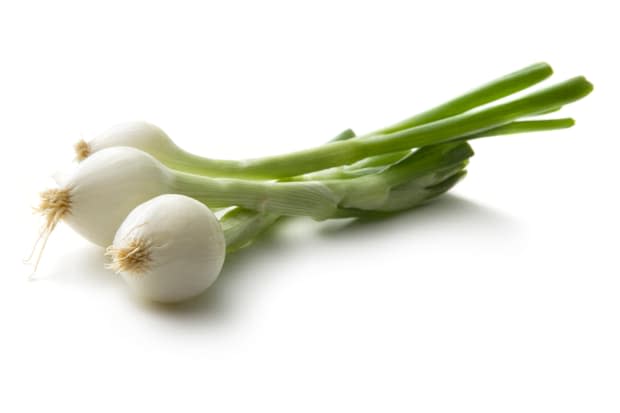Scallions vs. Green Onions: Is There a Difference?
Find out if they're exactly the same, or if scallions and green onions differ.
Most of us are familiar with green onions. The name itself is very simple and descriptive. But what about scallions? Are they the same as green onions? And, if they are, why are they called by a different name? Why do some recipes call for scallions vs. green onions?
Some foods are simply more confusing than they need to be. Take for instance heavy cream vs heavy whipping cream. Basically, you're looking at a labeling difference. The same is almost true about scallions and green onions. However, there could be a slight difference at times, which makes the onions more comparable to maybe chicken stock vs. chicken broth.
So, how can you have two things that are at times exactly the same and at other times different? It's all about the plant. There is actually more than one plant that can be considered a green onion—meanwhile, there's only one plant that can be considered a scallion. Here is everything that you need to know when it comes to scallions vs. green onions.
Related: Have You Been Storing Your Onions Wrong All Along? Food Experts Clear Up the Confusion
Scallions vs. Green Onions
Scallions and green onions both usually come from the same plant, allium fistulosum, and are the same thing. Basically, it's up to the farmer to decide what they should be called when they are sent to market. The plant has long green stems that are sliced up in recipes that call for either scallions or green onions. At the base of the plant is a white bulb.

iStock
When Are Green Onions Different Than Scallions?
The confusion lies in the fact that some green onions actually come from a different plant. This is where the spring onion is introduced. A spring onion, or allium cepa, is a mini white onion. The white bulb at the end is larger and rounder (like an onion) than the base of a green onion is. However, when spring onions are harvested early, the green stems can be used as green onions.
So, to sum it up green onions can be both the allium fistulosum and allium cepa plants but scallions are only the allium fistulosum.
Related: Sour Cream and Onion, All Grown Up! Try the Sizzling Scallion Dip That’s Sweeping TikTok
Is There a Difference in Taste Between the Two Green Onion Plants?
The flavor of green onions and scallions that come from the allium fistulosum plant is somewhat sharp and peppery. The flavor is not exactly the same as green onions that come from the early harvest of spring onions.
Green onions from spring onions have a more intense flavor than scallions. This means a little bit goes a long way when spicing up a dish with onion. However, the bulb or small white onion of the plant provides a sweet flavor and can be used as a substitute for sweet yellow onions.
Since there is a difference in the intensity of taste between the two green onion-producing plants, you'll want to choose the correct one for your particular preference. If you want a more intense green onion, look for the stems that have a round white or reddish bulb at the end. Otherwise, look for stems that are narrow and flatter, which is the most common.
If the onions are labeled as scallions, they will always be a sharp and peppery flavor. However, if they are labeled as green onions, watch for the bulb size to determine how intense the flavor will be of the greens.
Related: Cloudy Day? No Problem! 19 Best Vegetables and Plants To Grow in the Shade
Summing Things Up
For the most part, green onions and scallions are the same thing. They are commonly from the allium fistulosum plant which has a flatter and narrower white base. This is what you typically find at the grocery store labeled either green onions or scallions.
The only time that green onions are different from scallions is when they come from the early harvest of a spring onion or allium cepa. Although the green stems are considered to be green onions as well, they do have a more intense flavor.
Next Up: These Are the 20 Healthiest Vegetables of All Time, According to Registered Dietitians
